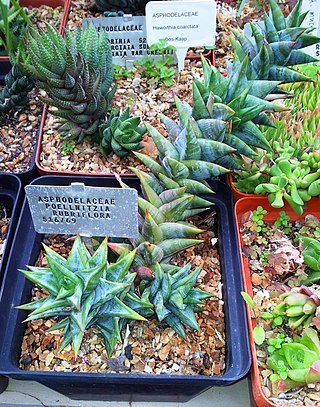
Astroloba rubriflora is a succulent plant found in the mountainous Karoo area around Robertson, South Africa. It is listed as a Vulnerable species on the IUCN global Red List.

Oscularia is a genus of succulent flowering plants in the family Aizoaceae, native to semi-arid and rocky habitats in the Western Cape of South Africa.

Astroloba is a genus of flowering plants in the family Asphodelaceae, subfamily Asphodeloideae, native to the Cape Province of South Africa.

Anisochilus is a genus in the family Lamiaceae, commonly called as Kapuri first described in 1830. It is native to China, the Indian Subcontinent, and Indochina. Has healing properties that deal with treatment for ailments known as gastric ulcer and helps with dermis issues. Anisochilus also has active properties such as camphor, leutiolin, and apigenin. A new hygrine-like compound has been found within the DNA of this plant.

Tulista is a small genus of succulent plants endemic to the Cape Provinces of South Africa. They were formerly included within the genus Haworthia.
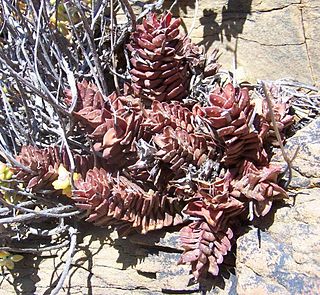
Astroloba bullulata is a small succulent plant of the Astroloba genus, endemic to mountainous areas of the southern Cape, South Africa.

Astroloba corrugata is a small succulent plant of the Astroloba genus, endemic to the Little Karoo and the far south of the Western Cape, South Africa.

Astroloba spiralis is a small succulent plant of the Astroloba genus, endemic to the southern Karoo regions of the Western and Eastern Cape Provinces, South Africa.
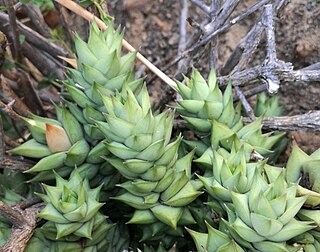
Astroloba herrei is a small succulent plant of the genus Astroloba, restricted to the area around the Swartberg mountains, South Africa.

Astroloba congesta is a small succulent plant of the Astroloba genus, indigenous to the Eastern Cape, South Africa.
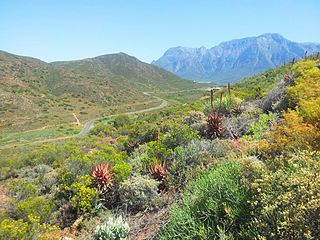
Robertson Karoo is a semi-arid vegetation type, restricted to sections of the Breede River Valley, Western Cape Province, South Africa. It is a subtype of Succulent Karoo and is characterised by the dominance of succulent plant species, and by several endemic plants and animals.
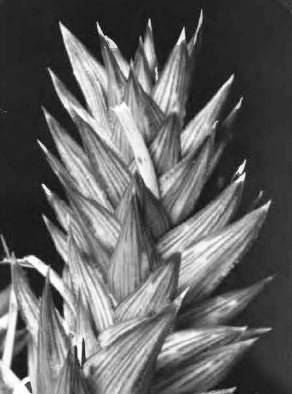
Astroloba pentagona is a small succulent plant of the genus Astroloba, restricted to an area of the western section of the Little Karoo, South Africa.

Astroloba spirella is a small succulent plant of the genus Astroloba, restricted to an area of the western section of the Little Karoo, South Africa.

Astroloba robusta is a small succulent plant of the genus Astroloba indigenous to the arid southern Cape regions of South Africa. It is the most widespread Astroloba species.

Buffelspoort is the westernmost of five defiles that cut through the Swartberg Mountain range, situated in the Western Cape province of South Africa. The others are the Seweweekspoort, Die Poort, where the Gamka River transects Die Hel, Meiringspoort, and Snykloof at its eastern extremity.

Astroloba tenax is a succulent plant of the genus Astroloba, indigenous to the Western Cape Province, South Africa.

× Astrolista is a nothogenus of naturally occurring inter-generic hybrids in the Little Karoo region of the Western Cape Province, South Africa.

Aloeae is a tribe of succulent plants in the subfamily Asphodeloideae of the family Asphodelaceae, consisting of the aloes and their close relatives. The taxon may also be treated as the subfamily Alooideae by those botanists who retain the narrower circumscription of Asphodelaceae adopted prior to the APG III system. Typically, plants have rosettes of more or less succulent leaves, with or without a distinct stem. Their flowers are arranged in racemes and tend to be either small and pale, pollinated by insects, or larger and more brightly coloured, pollinated by birds. As of 2017, 11 genera are recognized, most created since 2010 by splitting off another five genera from Aloe and another two from Haworthia. Only two genera, Aloe and Aloidendron, are native outside southern Africa, extending northwards to the Arabian Peninsula. Seven genera are restricted to South Africa, some with small ranges. Members of the Aloeae are cultivated by succulent plant enthusiasts; Aloe species especially are used in temperate climates as ornamental garden plants. Some species are used in traditional medicine. Aloe vera and Aloe ferox are cultivated for their extracts, whose uses include moisturizers and emollients in cosmetics.
Boronia cremnophila, commonly known as the Kimberley cliff boronia, is a plant in the citrus family, Rutaceae and is endemic to a small area in the Kimberley region of Western Australia. It is an erect or spreading shrub with both simple, and trifoliate leaves, and white sepals and petals, the sepals larger than the petals.
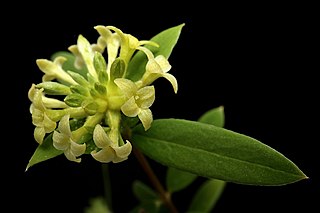
Pimelea cremnophila, commonly known as gorge rice-flower, is a species of flowering plant in the family Thymelaeaceae and is endemic to a restricted area of New South Wales. It is an erect shrub with narrowly elliptic to narrowly egg-shaped leaves arranged in opposite pairs, and groups of up to four flowers that are sometimes male-only or female-only.



















